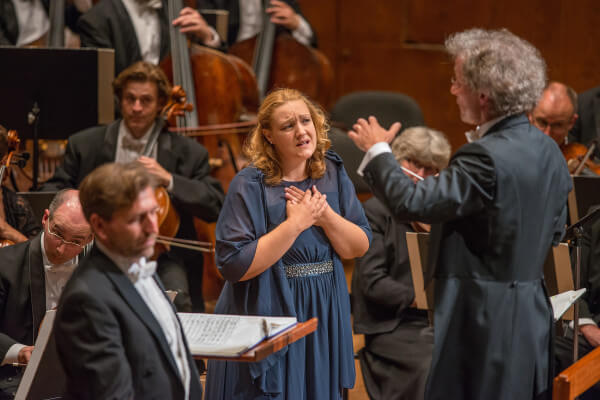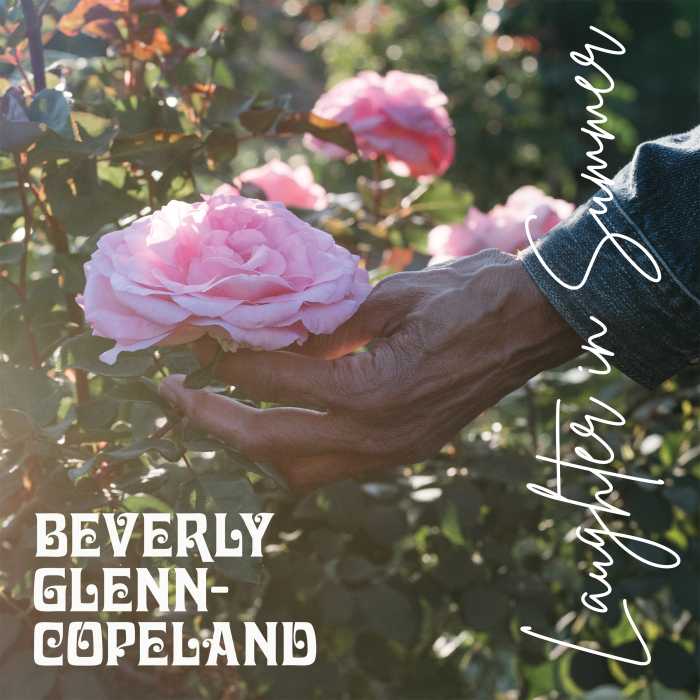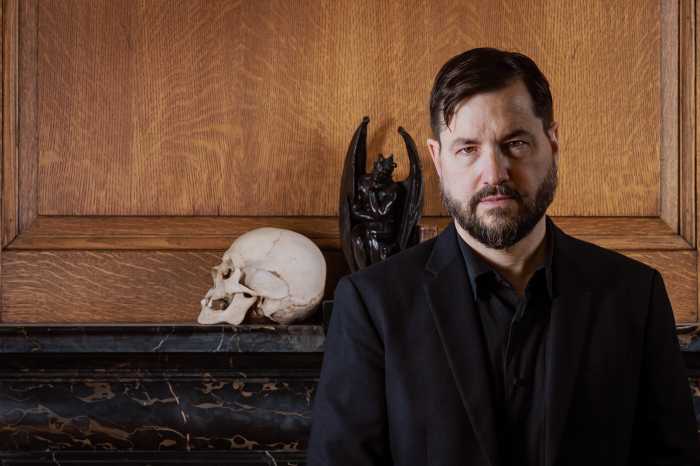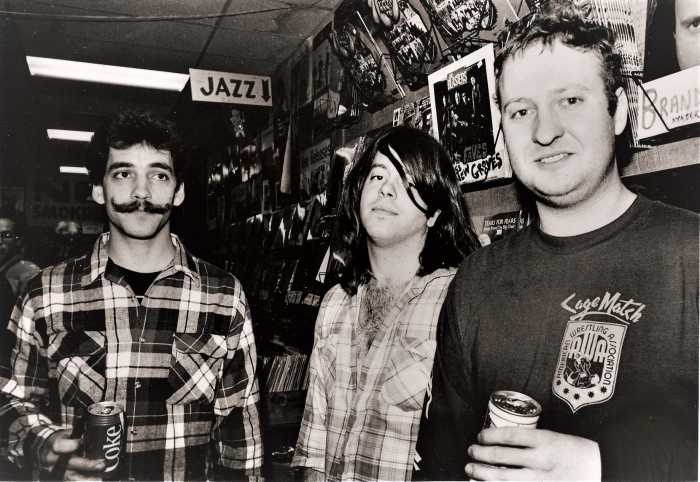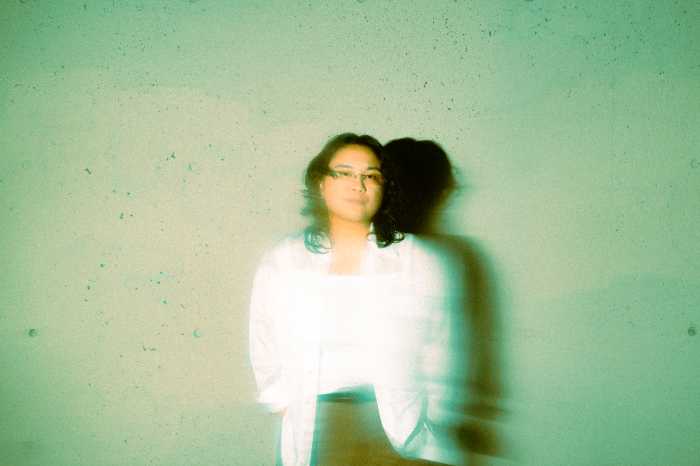Soprano Regine Hangler (as Daphne) performing in Richard Strauss's “Daphne;” The Cleveland Orchestra, Music Director and Conductor Franz Welser-Most | STEPHANIE BERGER
BY ELI JACOBSON | Most operatic heroines are defined by their romantic relationships with men. In the 20th century, new operatic heroines emerged who did not fit into that paradigm. These modern heroines are defined by their relationships with religion, nature, politics, society, and other women. This July, two summer festival presentations featured female outsiders who scorn male-dominated society and traditional women’s roles, and suffer tragic consequences.
The titular heroine of Strauss’ “Daphne” is a virginal innocent who spurns the advances of the god Apollo and her childhood playmate Leukippos because she desires to be one with nature. She gets her wish in the finale — another musically transcendent Strauss tone poem for soprano and orchestra – when Apollo transforms Daphne into a laurel tree. As she undergoes metamorphosis, Daphne’s wordless vocalise becomes one with shimmering strings, suggesting wind blowing through branches. “Daphne” was presented locally in a staged production by the New York City Opera in 2004, and in concert at Carnegie Hall in 2005 with Renée Fleming, Johan Botha, and the WDR Symphony Orchestra of Cologne under Semyon Bychkov. The 2015 Lincoln Center Festival presented Strauss’ 1938 “bucolic tragedy” in concert at Avery Fisher Hall with Franz Welser-Möst leading the Cleveland Orchestra. Joseph Gregor’s libretto is static and places baroque demands for onstage magical transformations. I think it works better as a concert opera where the imagination can supply the images and the orchestra is front and center.
At the second performance on July 18, the Cleveland Orchestra surpassed both the Cologne and New York City Opera ensembles. Welser-Möst revealed the complex inner voices within the dense orchestral scoring rather than imposing a pompous interpretation upon it. Late Strauss can degenerate into busy, empty bombast, but that was not the case here. There were discrete layers of sound with a distinct color and dynamic level that blended together into a rich harmony of nature painting and impressionistic drama. The soloists, less glamorous figures and voices than Elizabeth Futral, Fleming and Botha, were nevertheless more stylistically attuned to the piece. Regine Hangler convinced in the title role with a tautly radiant soprano, sensitive musicianship, and insightful textual delivery. Hangler’s nearly vibratoless tone is instrumental, suggesting a childlike, unworldly creature. She possessed ample cut and reach for the demanding climaxes and theatrical conviction in her phrasing. Heldentenor Andreas Schager tore into the killer role of Apollo with tireless enthusiasm and energy. The vocal line bangs away mercilessly at the upper third of the heroic tenor range, yet Schager never shied away from challenges or degenerated into tuneless shouting. As Leukippos, Norbert Ernst sang with focused lyric tone and astute musicianship. In the deep contralto role of Gaea, Nancy Maultsby made a grainy, dull sound. Bass Ain Anger was effective as Peneios. Welser-Möst’s inspired leadership focused the complex choral, orchestral, and vocal forces toward revealing the full musical richness of Strauss’ masterpiece.
Poulenc’s “Dialogues des Carmélites” concerns another conflicted outsider, Blanche de la Force, a sheltered French aristocrat who flees from her fear of life into the safety of a Carmelite convent. The French Revolution follows her behind convent walls, and she faces her fears and ultimate death at the guillotine with a heroic serenity bestowed upon her as a divine gift. Will Crutchfield presented “Dialogues” on July 25 in a minimally staged production (by his daughter Victoria Crutchfield) as part of this summer’s “Bel Canto at Caramoor” series. Crutchfield and his daughter clearly love this opera (despite it not being a 19th century bel canto work) expanding on the production Victoria mounted three years ago for Dell’Arte Opera. Presented in the original French, every cast member gave a full theatrical performance. The orchestra was sectioned off upstage while the dramatic action was played downstage with full blocking, props, costumes, and stage furniture. Despite being presented for one night only with several lead singers making role debuts, there was a sense of intensive preparation and complete musical and dramatic realization.
Jennifer Check as Blanche and Hei-Kyung Hong as Mme. Lidoine initially seemed cast against type, and might profitably have switched roles. Check’s bright, metallic spinto suggested Blanche’s nervous intensity and expanded effectively for dramatic climaxes. Initially, Hong’s delicate lyric soprano seemed light for the Second Prioress. In Act III, Lidoine’s address to the sisters in prison possessed both tonal radiance and a creamy core conveying spirituality and gravitas in equal measures. Jennifer Larmore’s Mère Marie dramatically fell into predictable bitch-face postures (this formidable nun has both admirable and problematic qualities), but delivered a vocally assured performance with particular success in the high climaxes. As Sister Constance, Alisa Jordheim’s pure, rounded soprano tone embodied childlike innocence avoiding grating chirpiness. Tenor Noah Baetge, as Blanche’s brother, and bass Daniel Mobbs, as her father, combined sturdy lyricism with clear French diction. Towering above them all, former Wagnerian soprano Deborah Polaski triumphed as Mme. de Croissy. Now in her late career “Martha Mödl” dramatic character singer phase, Polaski acted tellingly with her eyes and entire body. Polaski realized the harrowing spiritual and physical anguish of the dying First Prioress singing with disciplined power and telling restraint. Crutchfield’s penchant for transparent, clear orchestral textures perfectly suited the spare asceticism spiked with tangy harmony of Poulenc’s score, beautifully played by the Orchestra of St. Luke’s.

